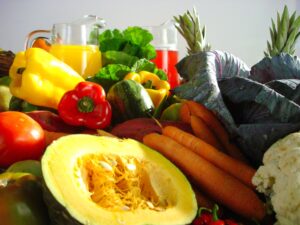Dietary fiber, also known as roughage, is made up of the parts of foods like skin, rind, seeds and stalks your intestinal system can’t digest or absorb. However, fiber plays a significant role in health by absorbing bad nutrients, like cholesterol, and removing them from the body. According to the Mayo Clinic, increasing the amount of high-fiber foods you eat can help reduce the risk of a variety of diseases and conditions.
A high-fiber diet aids in digestion and has many health benefits
Fruits & Berries
Fruits and berries contain soluble fiber, which means they dissolve in water. Soluble fiber helps lower cholesterol and blood sugar levels. In addition to providing fiber, they are rich sources of vitamins and minerals. Fruits which provide you with a comparatively high fiber content (compared to other fruits) include: blackberries, strawberries and raspberries; pears and apples (eaten with their skins; bananas, oranges, mangos, guava, figs and raisins.
Grains, Nuts & Seeds
Whole grains are good sources of insoluble fiber, which does not dissolve in liquid. This helps with constipation by cleaning out obstructions as the mass moves through the colon. Insoluble fiber also helps control the acidity levels in the intestines.
High-fiber grains, nuts and seeds and foods include: bran, brown rice, whole wheat spaghetti, barley (soluble fiber), oatmeal, popcorn, rye bread, legumes like split peas (soluble fiber), lentils, black beans, lima beans and baked beans, sunflower (insoluble fiber) and flax (soluble fiber) seeds, and nuts like almonds, hazelnuts, coconuts, pecans and pistachios.
Cereals and pastas made from whole grains are a good source of dietary fiber. Nutrition labels on food packages contain information on dietary fiber, which will let you compare these products against each other to pick ones that give you more of your recommended daily allowance of fiber.
High-Fiber Vegetables
Vegetables are another source of insoluble fiber. Adding the following vegetables to your diet will increase your intake of fiber: artichokes, broccoli, Brussels sprouts, carrots (soluble fiber), corn, peas, potatoes with skin on, and boiled turnip greens. Don’t worry about “too many carbs” – they should make up most of your diet.
Additional Resources
